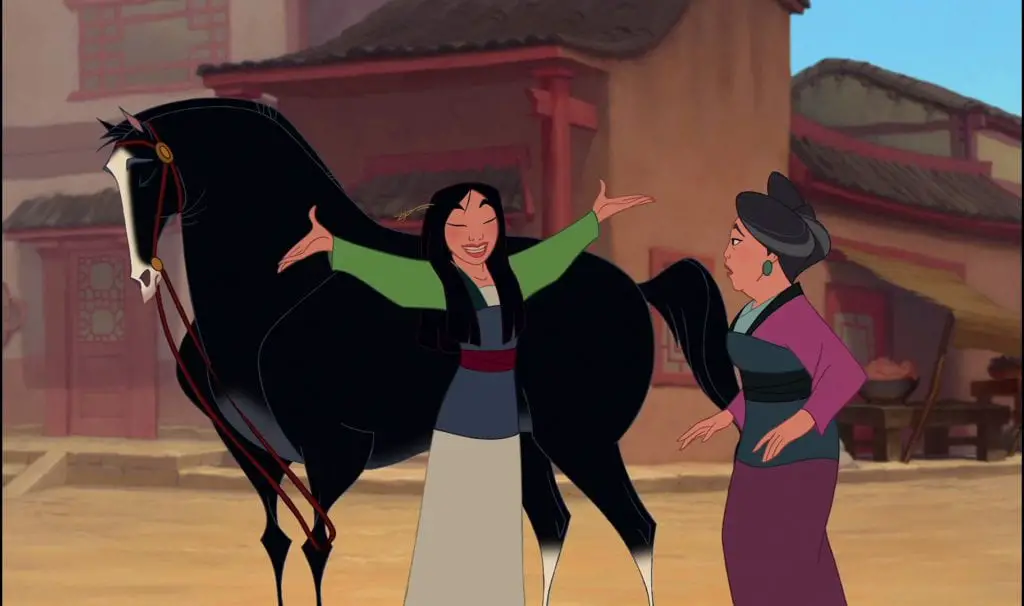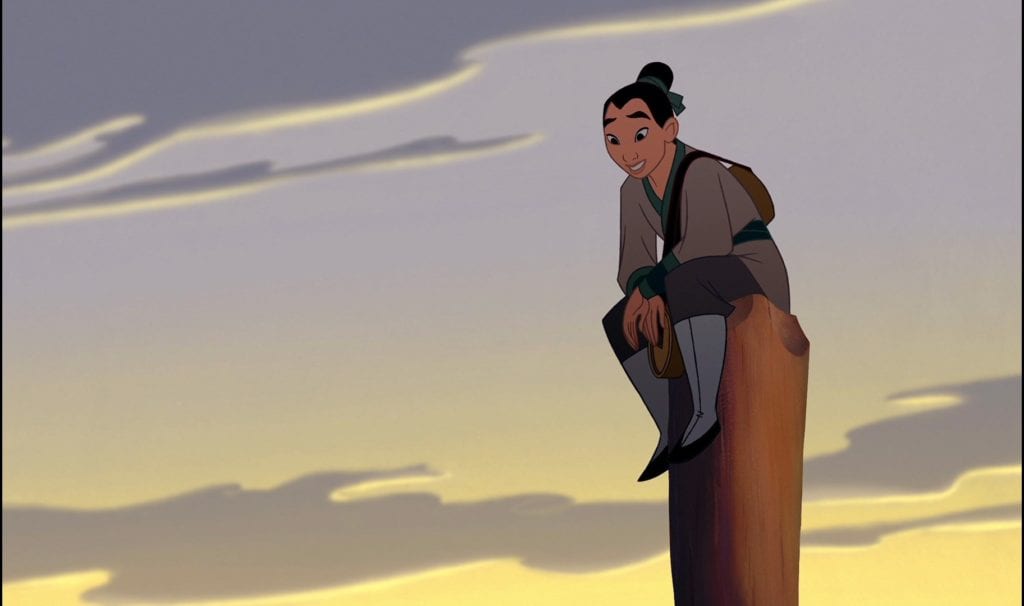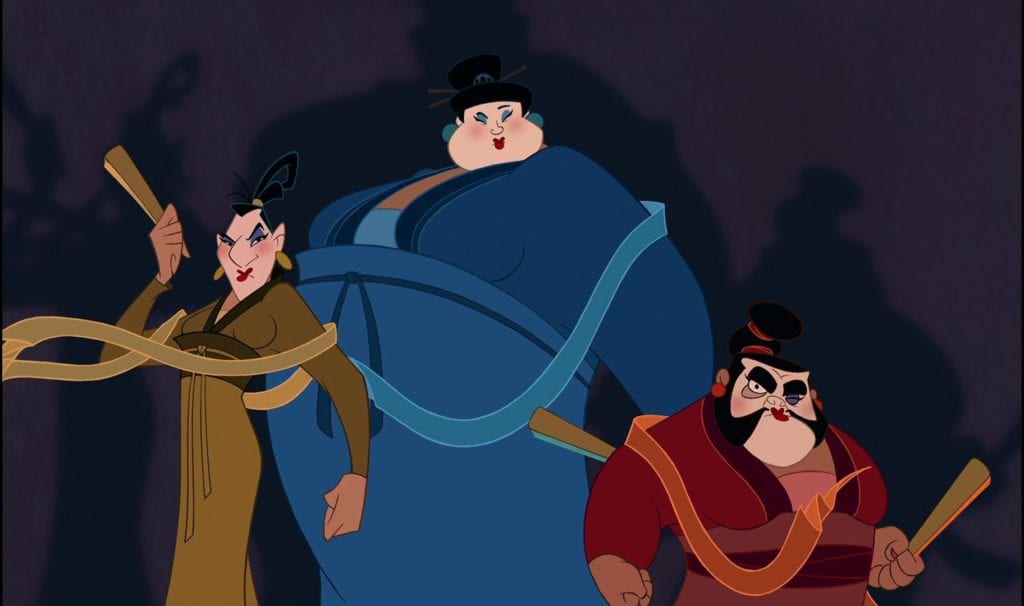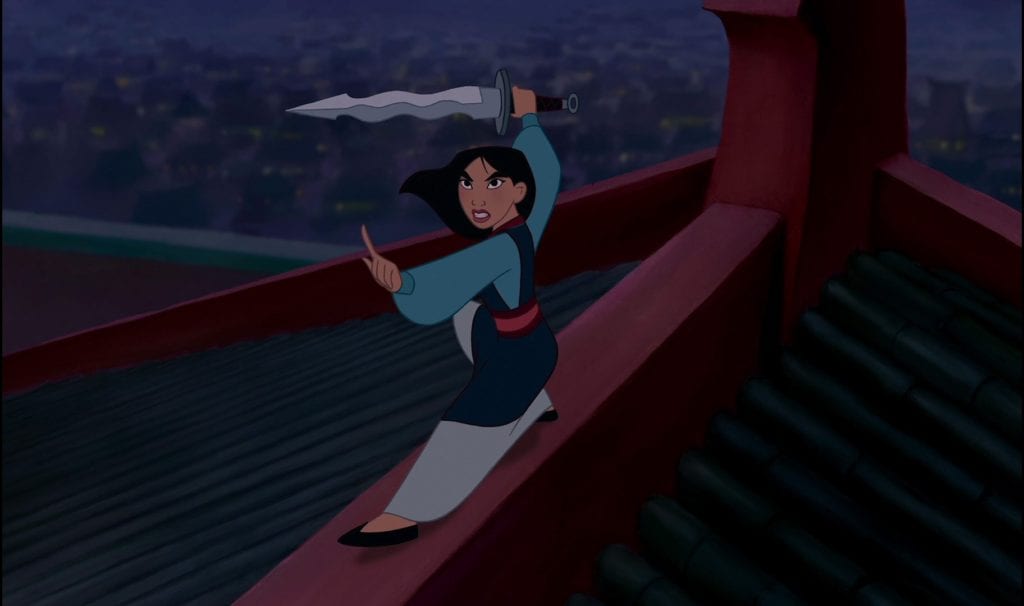Everyone has a favourite Disney Princess. As a child, Mulan was mine. Mulan is a favourite of many, with good reason. Before her the princesses who graced our screen at best reacted to the narrative as it happened around them. At worst they were completely passive as other characters, mainly their princes solved the conflict. Then Mulan came along and our heroine was the one pushing the narrative forward. She chooses to steal her father’s armour and sword to protect him. She sets out to save her father and ends up saving all of China. But Mulan does so much more than tell a story of a girl who saved China. Mulan contests gender conventions, pushing against having to exist at the extreme ends of the gender spectrum.
Even by modern standards, Mulan challenges gender roles, let alone in 1998 when it premiered. Mulan has to disguise herself as a man to take her father’s place as a soldier. Just by doing this she’s committed a crime punishable by death. At the same time, Mulan’s internal conflict comes from lacking all the graces valued in women. Quiet, demure, graceful, delicate, refined, poised, punctual. All words said by Mulan herself to describe an ideal woman, according to her society. All words she’s shown to be the opposite of.

Feminine and Masculine portrayals of gender are contrasted time and time again in the movie, particularly early on. The first song spells out the gender expectations of Mulan’s society. Men serve by ‘bearing arms’ and women by ‘bearing sons’.
“A girl can bring her family
Great honor in one way
By striking a good match,”
Mulan then spends the rest of the movie turning this on its head. Even before the word of the war reaches Mulan’s village, Mulan’s core motivation is to bring honour to her family. If that means putting on a dress and makeup she’s not completely comfortable with that’s what she’ll do. When she takes her father’s place as a soldier, she sees a new opportunity to bring her family honour in a way she never could as a ‘daughter’.
It’s notable that whether her gender performance has to be extremely feminine or extremely masculine it’s in the moments of those extremes she’s shown to be the most uncomfortable. Dressed up as either the ‘perfect porcelain doll’ or as the gruff soldier with the manly urge to kill something, these are when she’s most awkward. Her personality is most natural when allowed to temper her gender performance. Be it in her family’s garden when she can jump on the railings of a small bridge in her dress, or in the army after she’s found friendships and her deception really only extends to changing her voice, not her personality.

The movie gives a message about the importance of finding a balance between the feminine and masculine. The army is introduced to Mulan and audience through a very masculine act, a fistfight breaking out because Mushu threw an insult at Yao. Yet, as much as this violence is associated with masculinity in media in general, Mulan denounces it as inappropriate. Shang, the paradigm set by the movie for masculinity, berates the troops for their actions and punishes them accordingly. Here the hyper-aggressive and violent isn’t held up on a pedestal, its treated as counterproductive and harmful.
‘I’ll Make a Man Out of You’ is not just the best song of the movie. It’s the roadmap giving to the characters for becoming men. Its focus is on strength, but the song also highlights tranquillity and balance as traits the soldiers need to obtain. Aspects that aren’t far off from quiet, graceful and poised, all of which were applied to the women earlier. Mulan and the other soldier have to learn these traits before they are deemed ‘men’.
Even the Huns aren’t presented as just violent brutes. There is no doubt they are the strongest force in the movie, demolishing a highly trained army off-screen. While they are the closest to that hyper-masculine ideal the movie pushes against, they are given greater depth than that. They’re shown to be observant and clever enough to deduce the Imperial army’s location with a few clues and with small numbers they formulated and executed a plan to capture the Emperor.
Shun Yu is one of the few characters in the movie to not underestimate Mulan because she’s a woman. When she reveals herself to him, he sees the soldier from the mountain that cost him his army and determines her the bigger threat over Shang who he’s already mostly defeated. The moments the Huns achieve their greatest levels of success are when they use cunning and tactics in conjunction with their strength; the aforementioned victory over the army and the capture of the Emperor.

But both times Mulan defeats them is when they charge in with overwhelming force that ultimately fails to her resourcefulness and intelligence. In the mountain pass, the entire Hun army rides in without abandon to sweep a much smaller force that has no chance of winning a direct confrontation. Mulan defeats them by turning their reckless overconfidence against them and causing an avalanche.
She wipes out most of the Hun army by disregarding Shang’s order, ignoring the biggest threat, Shan Yu and seeing the bigger opportunity. She disregards the obedience that had been taught to her both as a woman and a soldier to claim a huge victory.

Later on, she takes victory again by fully embracing the fact women are as good as invisible, disguising Yao, Ling and Chien Po as women to get close to the Huns without suspicion. She defeats Shan Yu in his moment of overconfidence, thinking she has no more options.
Mulan never outrightly rejects femininity, only the aspects of it that make her uncomfortable. She takes care of her father and the household. She’s shown wearing dresses without qualms. Not only that, but she’s shown to be comfortable enough in them to do highly physical acts. She defeats Shan Yu wearing a dress, armed with only a fan. Mulan disarms Shan Yu using a fan. A fan, which throughout the movie was a symbol of femininity. In the same way, Mulan never fully embraces hyper-masculine ideals. Mulan doesn’t become a violent killing machine in the army. She doesn’t even begin to succeed in those masculine coded trails until she applies her ingenuity to the situation. She takes those traits as her own, using them on her own terms.

Mulan, both the character and the movie, find strength in the feminine, the masculine and balance in-between.

